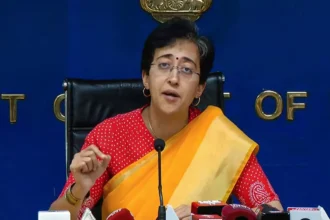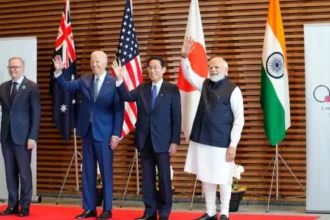Introduction
In a recent development that has added further tension to the already volatile relationship between Iran and Israel, Iran’s Supreme Leader Ayatollah Ali Khamenei awarded Brigadier General Amir Ali Hajizadeh, the commander of the Islamic Revolutionary Guard Corps’ (IRGC) Aerospace Force, with the prestigious “Order of Fath” medal. The medal was awarded for his pivotal role in orchestrating a recent missile attack on Israel, highlighting Iran’s strategic moves and its readiness to escalate the conflict. This attack, dubbed the “Honest Promise” operation, underscores the deep-rooted enmity between the two nations and raises concerns over the escalating hostilities in the Middle East.
The following article will delve into the details of the award ceremony, the missile attack, its implications on the Israel-Iran conflict, and the potential consequences for the broader Middle East region.
The Award Ceremony and Its Symbolism
On October 6, 2024, Iran’s Supreme Leader Ayatollah Ali Khamenei honored Brigadier General Amir Ali Hajizadeh with the “Order of Fath” medal during a high-profile ceremony attended by Iran’s top military officials. The “Order of Fath,” meaning “Conquest,” is one of the highest military honors in Iran, awarded to those who have demonstrated significant courage and success in military operations. The fact that this medal was awarded to Hajizadeh for leading a missile strike on Israel highlights the symbolic value of the operation in Iran’s strategic calculations.
Khamenei praised Hajizadeh’s leadership in planning and executing the missile attack, emphasizing the importance of the operation as a “direct response to Israeli aggression.” He stated, “The recent attack shows Iran’s unwavering resolve to confront its enemies and defend the rights of the oppressed people of Palestine.” The award is seen not just as recognition of military success but also as a clear message to Israel and other nations that Iran will continue to defend its interests aggressively.
Details of the Missile Attack
The missile attack on Israel—referred to as the “Honest Promise” operation—was carried out by the IRGC Aerospace Force under the leadership of Brigadier General Hajizadeh. The attack involved approximately 200 missiles targeting key Israeli military facilities, including intelligence and air defense infrastructure. This missile strike was a response to an Israeli airstrike in Beirut, which reportedly killed Hezbollah leader Hassan Nasrallah and IRGC General Abbas Nilforushan. The operation marked the second time in the past six months that Iran launched a direct attack on Israel, signaling a significant escalation in the ongoing conflict.
Iran’s missile assault on Israel underscores the capability and reach of the IRGC’s missile program. Brigadier General Hajizadeh, known for his expertise in missile technology, has played a key role in expanding Iran’s missile capabilities over the years. His leadership in this operation has further solidified his standing within the Iranian military establishment.
Escalating Conflict and Regional Implications
The missile attack has only deepened the Iran-Israel rivalry, with both nations ramping up their military activities. Following the attack, Israel has vowed to retaliate, with Israeli Prime Minister Benjamin Netanyahu stating that “Iran’s hostile actions will not go unanswered.” Israel’s military has been put on high alert, and airstrikes against Hezbollah positions in southern Lebanon have intensified since late September, causing significant casualties and displacement across the region.
The escalation of hostilities between Iran and Israel has far-reaching consequences for the Middle East. The involvement of Hezbollah, Iran’s key ally in Lebanon, has also added another layer of complexity to the conflict. Hezbollah, which has been active along the Israel-Lebanon border, has faced numerous Israeli airstrikes that have targeted their supply lines and infrastructure. The ongoing conflict is not only destabilizing Lebanon but also affecting neighboring countries, threatening the fragile balance in the region.
Broader Tensions in the Region
The missile attack on Israel and the subsequent Israeli retaliation are part of a broader power struggle between Iran and Israel, with Syria and Lebanon becoming major theaters of confrontation. The two countries have been engaged in a shadow war for years, with Iran providing support to proxy groups like Hezbollah and Hamas, while Israel continues its campaign of targeted strikes against Iranian forces and affiliated militias in Syria and Lebanon.
The escalating conflict has also raised concerns about the safety of civilians in Lebanon and Syria, who have been caught in the crossfire. The recent missile strikes by Israel have led to numerous casualties, including civilians, as hospitals and infrastructure have been hit in both Syria and Lebanon. According to the United Nations, over 1.2 million people have been displaced in Lebanon due to the conflict, and hospitals in cities like Beirut have reported severe casualties, with more than 40 paramedics and firefighters killed by Israeli fire in just three days.
The missile attack and the award to Hajizadeh have also heightened fears about a potential direct confrontation between Iran and Israel. Both countries possess significant military capabilities, and any miscalculation could lead to an all-out war, with devastating consequences for the entire Middle East. The international community has expressed concern, urging both sides to exercise restraint to avoid further escalation.
Iran's Strategic Messaging
The decision to award the “Order of Fath” medal to Brigadier General Hajizadeh is not only an acknowledgment of his leadership but also a strategic message to both domestic and international audiences. Domestically, the award serves to boost the morale of the Iranian military and reinforce the image of the IRGC as a strong defender of Iran’s interests. It also aims to rally public support by showcasing Iran’s readiness to confront its adversaries.
Internationally, the award is a clear warning to Israel and its allies, including the United States, that Iran is willing to take bold actions in response to perceived threats. It also demonstrates Iran’s resolve to continue supporting groups like Hezbollah and Hamas, which are key components of its regional strategy to counterbalance Israeli influence. The missile attack and the recognition of the IRGC’s role in it have further complicated the geopolitical dynamics in the region.
Global Reactions and Condemnation
The international community has reacted with concern to the recent developments. The United States and several European countries have condemned the missile attack, calling it an act of aggression that threatens regional stability. The United Nations has called for de-escalation and dialogue, warning that the current trajectory could lead to a major humanitarian crisis in the Middle East.
In contrast, Iran’s allies, including Syria and certain factions within Lebanon, have expressed support for Iran’s actions, framing the missile strike as a legitimate response to Israeli aggression. The Russian government has called for both sides to exercise restraint and avoid further escalation, emphasizing the importance of diplomatic efforts to resolve the conflict.
The Role of Brigadier General Amir Ali Hajizadeh
Brigadier General Amir Ali Hajizadeh has been a key figure in the IRGC’s Aerospace Force for years, playing a crucial role in the development of Iran’s missile capabilities. Under his leadership, the IRGC has expanded its missile arsenal, enhancing Iran’s ability to strike targets across the region. Hajizadeh’s expertise in missile technology has made him a prominent figure in Iran’s military strategy, and his role in the recent attack on Israel has further elevated his status within the military hierarchy.
The award of the “Order of Fath” medal to Hajizadeh is a testament to his contributions to Iran’s defense strategy and his ability to execute complex military operations. It also highlights the central role of the IRGC in shaping Iran’s regional policies and its commitment to countering perceived threats from Israel and its allies.
Conclusion
The decision by Iran’s Supreme Leader Ayatollah Ali Khamenei to award Brigadier General Amir Ali Hajizadeh the “Order of Fath” medal for his role in the recent missile attack on Israel is a significant development in the ongoing conflict between the two nations. The attack and the subsequent recognition of Hajizadeh’s role serve as a clear message to Israel and the international community about Iran’s willingness to escalate its confrontation with its adversaries.
The escalating tensions between Iran and Israel pose a serious threat to regional stability, with the potential for further violence and a broader conflict involving other nations. As both sides continue to engage in aggressive actions, the international community must intensify its efforts to facilitate dialogue and prevent a catastrophic war in the Middle East. The situation remains precarious, and the recent events underscore the urgent need for diplomatic engagement to defuse the tensions and avoid further escalation.









